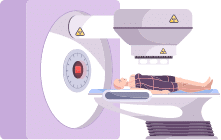Signs & Symptoms

The pancreas is deep inside the body and cancer in this area does not usually cause early symptoms. Some common symptoms of pancreatic cancer may include
- Tiredness & Abdominal Pain
- Whites of the Eyes (Jaundice)
- Yellowing & Itching of the Skin
- Loss of Appetite
- Diabetes that’s Difficult to Control
- Dark Urine and Weight Loss
Types of Pancreatic Cancer

There are several different types of pancreatic cancer, including pancreatic adenocarcinoma, which is the most common type. Other types of pancreatic cancer include
- Neuroendocrine Tumors
- Pancreatic Ductal Adenocarcinoma
- Pancreatic Acinar cell Carcinoma
Causes

The exact cause of pancreatic cancer is unknown. Smoking and having specific inherited gene mutations are two factors that have been linked to an increased risk of this type of cancer.
Stages


Risk factors

- Smoking
- Exposure to toxic endocrine disruptors & chemicals
- Being overweight
- Being African-American
- Having diabetes and or pancreatitis
- Being older than 45 years
Prevention, Screening, Diagnosis & Staging

Treatment
Treatment for pancreatic cancer may include surgery, chemotherapy, and radiation therapy.
The specific treatment recommended will depend on the stage of the cancer, the type of cancer, and the overall health of the patient.
It is important for people with pancreatic cancer to receive care from a team of healthcare professionals, including a surgeon, medical oncologist, and radiation oncologist. Supportive care, such as nutrition therapy and pain management, is also important for patients with pancreatic cancer.
If you or a loved one has been diagnosed with pancreatic cancer, it is important to discuss all treatment options with your healthcare team and to consider participating in clinical trials, which are research studies that test new treatments. It is also important to take care of your physical and emotional well-being and to seek support from family and friends.

Surgery

Radiation

Chemotherapy

Targeted Therapy











 +91 44 4200 4200
+91 44 4200 4200 
